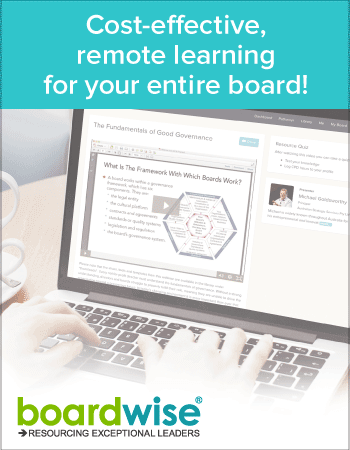board-recruitment
The Role of Newbies in the Boardroom
Published: July 6, 2018
Read Time: 4 minutes

Not-for-profit organisations are increasingly looking for a younger presence in the boardroom for the digital skill sets and perspective they can bring to emerging areas of board oversight, including strategy, digital marketing and online fundraising.
Changing a board’s demographics and traditions comes with risks as less experienced directors often require more training and resources early in their tenure to better understand and fill their roles. Often boards pair new members with experienced directors who serve as coaches during the transition.
Getting that first appointment is hard as many boards still are reluctant to appoint executives who don’t have a track record. It can take a few years to land your first board appointment. Often strong recommendations from experienced directors helps. As the average age of directors is around 58-60 years old, turnover remains low. If your board wants a fresh perspective and be challenged then appointing a newbie to the board may be the answer.
Over the next 5 years, board dynamics will change as we will see increasingly diverse boards which, in some cases, may lead to more challenge and debate around the board table. It will be important for board members to be open to this challenge and to work as a team to look for the best outcome for the organisation. Boards will need to work harder to avoid becoming compliance focussed, looking for ways to manage compliance whilst ensuring equal or greater attention on the other aspects of their role to ensure they continue to add value to the organisation.
Market dynamics will also change moving forward, which will require boards to correspondingly change. It is fair to assume that technology innovation will continue to increase the pace of globalisation which provides exciting opportunities for companies to more readily access much bigger markets. However, boards will need to regularly review their composition to ensure that they have the international expertise and understanding of the risks associated with globalisation and increased competition if they are to succeed.
Some of the most important skills that a director can have are an enquiring mind, the courage to question and an ability to analyse information quickly to identify possible issues. These are the skills that we need to be encouraging in workplaces and educational institutions if we are to give future directors the best grounding for the role. I suspect that we will also need to encourage future directors not to be scared off by the sense of increasing liability around the role of a director.
It will continue to be an individual’s own personal network that will heavily influence the professional opportunities that come their way. For example, executives who aspire to directorships, need to not only be able to demonstrate successful growth and enhanced productivity in their executive role but they also need to work hard to build and nurture their professional network so that they will be recommended for a board position.
The idea of diversity of skill-set in the boardroom is pretty much unchallenged now. However, there has definitely been a lot of focus recently on other aspects of diversity – particularly in relation to gender. I think there’s been some good progress as a result of this diversity focus but there is still a way to go and there remain many who resist it. It is important that we don’t see representation by particular groups as an end in itself – the aim is to ensure a diversity of perspectives on issues that come before the board. It’s also important that merit and skill remain foremost in any appointment decision to avoid any charge of tokenism.
The Next Generation are also becoming an increasingly vocal group especially the millennials coupled with being a growing consumer group. This perspective may be appropriate for many boards. Some view it as “critical for both strategic development and risk management to open up our board conversations to their perspectives” according to Holly Ransom, CEO of Emergent. She adds that “we’re not talking about handing the reins entirely to millennials (that would undo the whole diversity benefit), but about how the robustness of decision making can be enriched by their education.”
Finally, the appointment of a newbie to a board is about change, and embracing change is an obvious way of training the next generation of directors. Now over to a progressive Chair to help lead the way to be open to new value add and fresh perspectives around the boardroom.
Share this Article
Recommended Reading
Recommended Viewing
Author
-
Managing Director
Board Dynamics
- About
-
Henri Eliot is Founder and Managing Director of Board Dynamics. He has had a diverse international career through senior executive and board roles with large and complex organisations including: JP Morgan Chase, Deloitte, PwC and Bank of Montreal. At the time of writing Henri was Chairman Balle Bros Group, Trustee Plunket Foundation and President Canada New Zealand Business Council. Henri is a Chartered Fellow of the Institute of Directors in New Zealand and holds a BA from McGill University, LLB (Hons) from the University of London and MBA from Richmond University. He recently completed a post graduate degree from the University of Cambridge.
Found this article useful or informative?
Join 5,000+ not-for-profit & for-purpose directors receiving the latest insights on governance and leadership.
Receive a free e-book on improving your board decisions when you subscribe.
Unsubscribe anytime. We care about your privacy - read our Privacy Policy .










